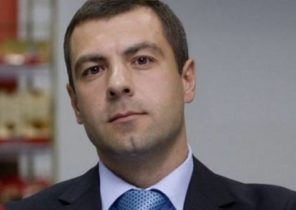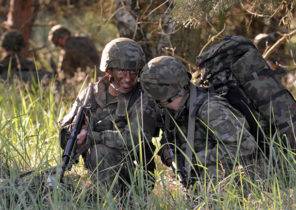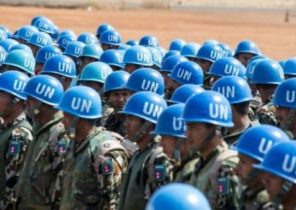
One December night it was pouring down rain and I stood under an umbrella in one of the dark alleys of Manila, near the building known drug den, waiting for night shift crime photographers and reporters hoping for luck to Shine on the scene. We knew the story only in General terms: the four men on the second floor preparing to smoke marijuana when they broke the attacker and shot them. The only witness to the murder was a sixteen year old boy, who because of the shock not able to say anything.
While the police surveyed the room upstairs, we checked the alley. But nothing was found. Only on the wall someone wrote two illegible synonym to the word “marijuana” in the local language: “dubie” and “chongkee”. It was a hangout for marijuana use. Now, before you pass any body had licensed funeral Director, worked at a place the group of criminalists. In such matters there is a certain course of action.
From the building a man came out and, obeying some impulse, stopped near me. Unlike us, he was dressed strictly. He was accompanied by local police, and I decided that he is the representative of authority, perhaps the captain of the local police. “Sorry,” he said hurried and busy tone, — “according to… according to the information here something terrible.” He was depressed, and I immediately noticed that this person may be the only person who saw something we have not seen: carnage, for example.
“According to information,” he repeated as if that phrase was the only thing he could rely on, when there was nothing to say, “according to information, something terrible happened in this country.” Then he turned to leave, and I decided to thank him for taking on a conversation with me. Nodding his head towards the room on the top floor, I asked: “can You tell me what happened?” It in horror looked at the scene, where he just left. He seemed to want to say one word, but changed his mind and said a fashionable acronym that insulted its natural demands. “EJK”, — he gave, “EJK!” and left. (EJK — extrajudicial killings, the execution without trial — approx. TRANS.)
In Manila in those rainy nights there are two kinds of murders. There is an operation called “buy-bust” (buy and bust — approx. TRANS.), when the offender knows that buying drugs from the disguised policeman. He panics, grabs a weapon such as a gun or a zip gun, but before you have time to use it (as scripted), it shoot. Since then, in early July President Rodrigo Duterte started the war on drugs, the country has seen nearly two thousand murders of this kind. Kill the dealers and addicts. According to Duterte, addicts are automatically added to the drug dealers. And not even as dealers, drug local drug “shabu”, he is purified meth, will soon lose the right to be called human beings. They lose their souls. And all that remains is to kill them.
That is a horrible cesspool. I found out about it, even without asking, right in the day of my arrival in the Philippines. Confused and inhuman drug “shabu”, see their families and anyone approaching him like a pack of wild animals. This person’s craziness. Either he, or they, victory or death. On human rights and say nothing, if you see a zombie. Look at the truth. Kill it before it kills you.
But look at it this way: just like Valium, which is nicknamed “mother’s little helper” in the same (and, frankly, pretty hypocritical) song of the Rolling Stones, in small doses, “shabu” helps the poor a little easier to bear the difficulties of life and work more. We learned about it at the funeral of a local Bicycle taxi driver from his pregnant widow. Once a week he used “shabu” under such pretext. His wife, in her own words, told him that once he is able to have children, nothing wrong with that. The calculation was only on his ability to feed his family. But in the calculation of the error crept in because he fell victim to extrajudicial killings.
The second type murder is death penalty without a trial, the number of cases which in December 2016 exceeded “busts”, as mentioned above, in the ratio of about two to one. The murder in the “buy-Basta” always someone attributed. Responsibility for the murder, as always written off to self-defence, takes on a specific group of policemen and, although repeating them from time to time the story can be questioned, no secret about who was involved, don’t. People shot by police “in self defense”, classified as “nanlaban”, which means “the resistance”. But he Duterte in his Christmas speech, which he delivered in a mixture of English and Tagalog languages, meant, apparently, that was found on the ground of such crimes the weapon was thrown, too, by his order:
“I said God, if they are there, destroy them. Especially while trying to resist. O ‘pag walang baril, walang-bigyan mo ng baril. [If they have no weapons, give it to them]. That’s a loaded gun — fight, because the mayor said let’s fight.”
The rules of the “Bai Basta” can be outright fiction, but the practice of extrajudicial killings is regarded as a terrorist act. The essential condition in this matter is the anonymity. No one knows who is the organizer of these operations and who performs them. Many of the comments Duterte regarding homicides is ambiguous. Speaking of murders committed with extreme cruelty when the victims are wrapped in plastic film heads (death allegedly as a result of asphyxia), Duterte stated the following:
“We don’t do that. It’s a dirty job. To associate someone unworthy of a man, and to wrap in foil — this is torture… don’t do it, neither the police or even soldiers. Why create unnecessary trouble and to wrap someone if you can just kill? We don’t do mummies”.
What we hear, and what you can extract from monotonous repetitive speeches of the President, it sounds like (and sounds like) bits of secret instructions to the police: if the victim has no weapons, give him a gun; don’t waste your strength on torture — kill. But as soon as the President criticized in such comments, next to it definitely appears assistant, which declares that, in saying this, the President exaggerated and that his words should be taken seriously, but not literally, or the President himself, in another speech condemns criticizing his party, calling them a variety of words. Meanwhile, his message to the public is: whatever happens, Duterte everywhere put his hand; and there is no significant difference between the “buy-bust his” and extrajudicial killings.
One of the extrajudicial killings, which I covered, was so: it was night and the whole family slept. Broke people in masks. “Where’s Fernando?” — asked one of them. The woman replied: “no”. At this point an eight year old girl woke up her father Ernesto. He woke up and managed to say only “Hey”, as here, was shot in the head. The attackers disappeared.
They almost always run away from the scene. One such case occurred in the North of Manila, a man was shot in the head in the maze are so narrow corridors of the building, there could hardly miss two people. Output there was only one design from awkward steps. Examining the staircase, I thought about how arrogant of planning murder of the criminals was to choose a place from where so hard to get out. Then they told me what you told the neighbors and they said the following: “When the shooting started, we all closed the door.”
Of course, closed. You closed and waited. And the killer knew you would. Speaking of doors, by the way, refers to nothing more than a piece of old plywood, clearly for something else and is completely unsuitable in order to replace the door. In another house a poor family in one of these entrance doors on both sides was a crack through which a killer can shoot inside. The second bullet found the man who was intended. And the first shot killed his six year old son.
You open your eyes. Your son is dead. Then kill you. This is punishment without trial (EJK).
At the funeral the coffins of the killed man and his son were put on display. Sympathetic came to support the family of those killed and (as is customary) to play cards men and women at separate tables. The person who died was visible through the glass or transparent plastic. On the coffin of a child placed newly hatched Chicks and put them in the feed. According to local tradition, the chickens, so peck the conscience of the killers. People looked at the face of the deceased child through the glass, smeared with bird droppings. The coffin sat the pregnant mother with a small child on his lap, both looked painful and was pale. And the Chicks continued to peck at the food.
Extrajudicial killing is instantaneous. A surveillance camera from one of the crime scene showed that at 01:58 in the house of one man, broke people in masks. After killing him, they went out and the timer still recorded 01:58. It was fully functional. The murderers took less than a minute to break into a house and make his case. This happened partly because the victim’s house constituted as a poor house, a cabin, occupying about 180 cm long and 120 deep.
It was obvious caring attitude of the owner to this building, partially made from the remnants of old painted blue and white fence. Grate in a small window was improvised from plastic children’s accounts, creating at least some semblance of personal space. The spectacle could be joyful many a shabby but colorful and cheerful dwellings, and at this time of year and decorated with Christmas toys — if not a corpse, forensics, and General undertakers, one of which had a t-shirt with the inscription: “the Crematorium and the columbarium of mother Teresa”.
The police calls the funeral Directors (with whom they seem to have an agreement), and the poor heart sinks at the thought of the value of their services. You will need at least a thousand dollars. It’s not uncommon for the woman to report the death of her husband, and her first reaction is a cry of despair that their family can’t afford it, and pleas not to take the body. But employees of the funeral home has its own work.
All this crowd is grieving. Beside me, two middle-aged men, one of them t-shirts as the local police, the other hugging her friend’s neck. Looking at how they rely on each other and support, we can assume that they’re a couple. But I think it only support. One of the men cried, and from time to time tears again dimmed his eyes. His ugly face of grief, as often happens, became even uglier. It’s ugly and at the same time touching, indifferent to the crowd, a face turned to the side of the house, in close quarters where the employees of the crematorium are trying to pack the body in the bag they brought.
On the scene arrive the night reporters and photographers, and together we quickly go along the slums, and people looking at us through doorways and know exactly why we’re here. In the crowd I can’t help but notice onlookers, dressed in clothes of the opposite sex, and transgender people, whose hair sticking out in different directions and painted in the wild colors (beauty industry — the only place where they can find work). Someone considers them aggressive to match the appearance, but they behave modestly and are as far as possible from the scene of the murder.
The fence journalists ask questions of her daughter murdered, that don’t believe that it has something to do with drugs. Her father was not using and did not sell. But he was arguing with someone over money entrusted to him in connection with any construction project. And her father was threatened, but for some other reason. So if her words were true, then this particular murder is due to the settling of accounts and adjusted as similar to it in execution without trial. The fight against drugs becomes a front for other forms of revenge.
As the hero of Gilbert Keith Chesterton’s father brown, “where would a wise man hides a pebble? On the sea shore”. And where would a wise man hide the body? On the field of battle. On this side was hidden by lots of stones. Now imagine all the different reasons for revenge: old grudges, rivalry, violation of honour, dignity, love Affairs and more. And then out of nowhere it may be rage, for example, due to excessive drinking or deteriorating mental and physical condition as a result of drug use.
Here’s a mysterious case, when the bodies were hidden in a conspicuous place: next to the bodies were found ordinary cardboard posters, which helped to identify the victims as “touts”. Barker is the person who calls passengers to ride on the local mode of transport, jeepneys. In this work, there is nothing shameful or antisocial — it really is the oldest profession, far older than the jeepneys. About the incident it is possible to build only guesses: for example, clicker might offend some of the passengers, so much so that he decided to take revenge from all representatives of this profession.
In two cases over a short period of time when I regularly went to the night shift, we came to the place of accident, where no one, it seemed, for the dead do not grieve. Once to the North of the city, at the most, it seemed, its outskirts, we left the car and went on foot along the dirt road. There was heard the singing of birds locked up in cages. I had a strong desire to return to rural life in the suburbs after many been in town for years (some time I lived in a remote area of Luzon).
People waited, clinging to the protective tape. We looked at the house, which belonged, according to neighbors, the man, whose hobby was pumped with drugs and open fire at random. Neighbors is, of course, didn’t like, and they contacted the police. That night they finally heard. When police arrived on the scene approached the house, the man opened fire on them and wounded one of the officers in the head (at first it seemed that death). According to police, the enraged man was at home, and stood next to a full bucket of bullets. He and three of his comrades were killed. Nobody, as far as we could judge, for him not to cry.
Another night we arrived at the scene, where the duty police proudly announced a “buy-Basta”. The deceased was a drug dealer, neodimom and, as we learned from neighbors, a man with a dark past who, it was said, killed his own son. Defended he is, as we said, using homemade guns. He was dead, but to get to him we could not because we had to overcome dangerous stairs. We sat down to wait for the loading of the body in the bag.
That part of the city in which he lived a drug dealer, at first glance it seemed the same cluster of shacks, which everywhere I met in my night shift. But upon closer inspection, she completely overshadowed the other. The houses were made of cinder blocks and real wood, and had two or more floors. Many of them were well painted and, although to call these places clean (or rats) would be an exaggeration, they looked neat and tidy. The more you looked at this picture the more I see evidence daily efforts of people living here to make life a little bit better than expected. And, of course, along the narrow main streets were hung with Christmas lights. Everywhere there were pots with sampaguita Philippine Jasmine. The people were friendly and welcoming and gave me an umbrella and a chair.
If what I have encountered in my night shift, and was something that to some extent met the expectations of voters in the presidential election in may for Duterte people, it was just these two cases. Duterte was and still is very popular, as its war on drugs to date. People approve of it, but don’t feel comfortable. They do not believe that the victims of this war need to die (although it still remains the determining factor). But if we are talking about the most dangerous persons in the above two cases, people are always ready to say, “He deserved it”.
In a survey conducted by the station social climate, 69% of respondents assessed the level of frequency of occurrence of cases of extrajudicial killings as a very or somewhat serious. Only 3% did not considered this a serious problem. On the question of whether respondents believe police who say the suspects were killed during the attempt of resistance, the number of votes equally divided: 28% believed that the police were definitely or probably telling the truth, while 29% thought the opposite. The vast majority, 88% fully or partly agreed that their district’s struggles with drugs became less after coming to power, Duterte. And this realization takes precedence over everything else.
Problems with drugs became less. They will even walk in the streets at night. What is striking is, at what cost. On the question of whether people would worry if they or someone they knew fell victim to murder without a trial, 45% said that they worried greatly, and 33% — to some extent. In other words, four out of five said that they largely would have bothered, if they or their friends could be tied up in the gutter with a mouth gag or be killed passing on a Bicycle by a man in a mask, or waking up early in the morning, would get a bullet in the forehead.
Whether justified their excitement? If you rely on statistics, then no. If you are a young poor man, Yes. After all, Duterte this war is mostly against the poor. And the higher you climb the social ladder, the less you are concerned.
This kind of reasoning, however, rather ignore the fact that the spread of terrorism. Targeted assassinations addressed to the drug dealers and addicts. Crazy and seemingly haphazard extrajudicial killings, the bodies, rolled up in Saran wrap and thrown on the roadside with brutal inscriptions on cardboard posters (one of them was painted with a smiley) are addressed to everyone: no one is safe.
The next day two men on a motorcycle was shot dead by a student. When the shooter returned to the co-defendant was heard as he said, “It’s not the one.”
This speed acts on the nerves. The killer took aim and shot realizes that he was wrong.
But such errors also play a role in this large-scale process: no one will be safe until you die many many others.
Research for this article provided by the Pulitzer center coverage of crises. This is the first of two articles.
James Fenton is a British poet and literary critic. From 1994 to 1999, he was Professor of poetry at Oxford. In 2015 he was awarded the English PEN club. From 1986 to 1989 he lived in the Philippines and wrote about this country for The New York Review.







